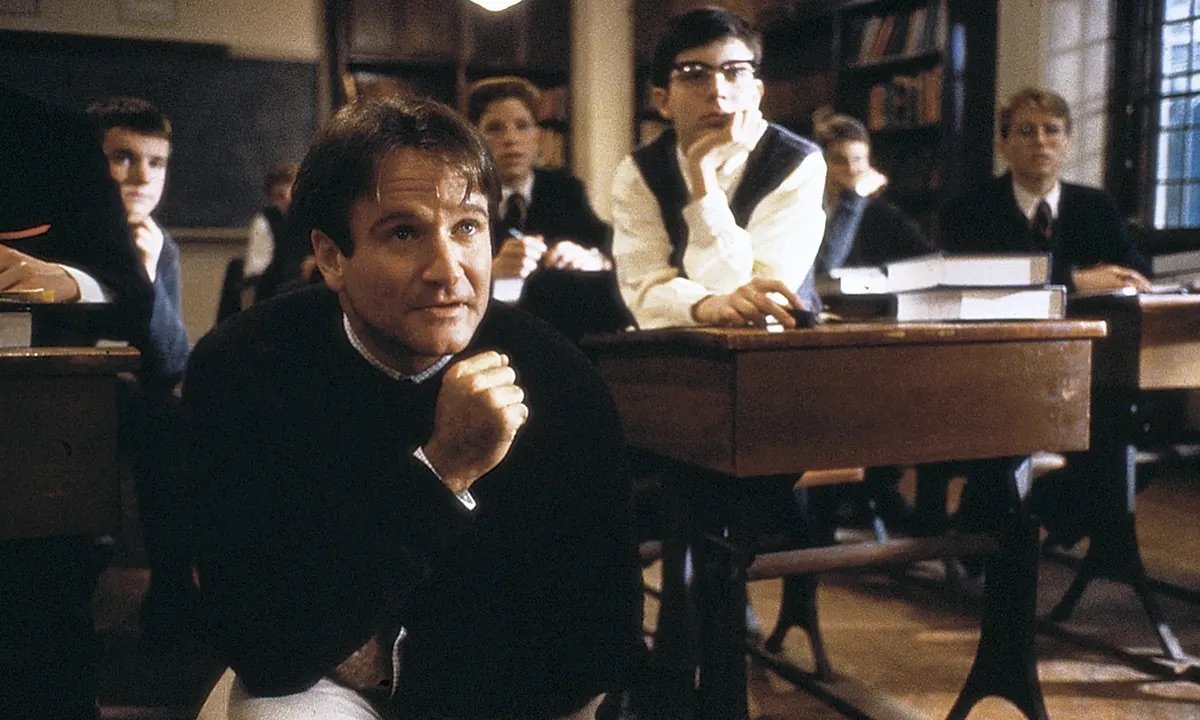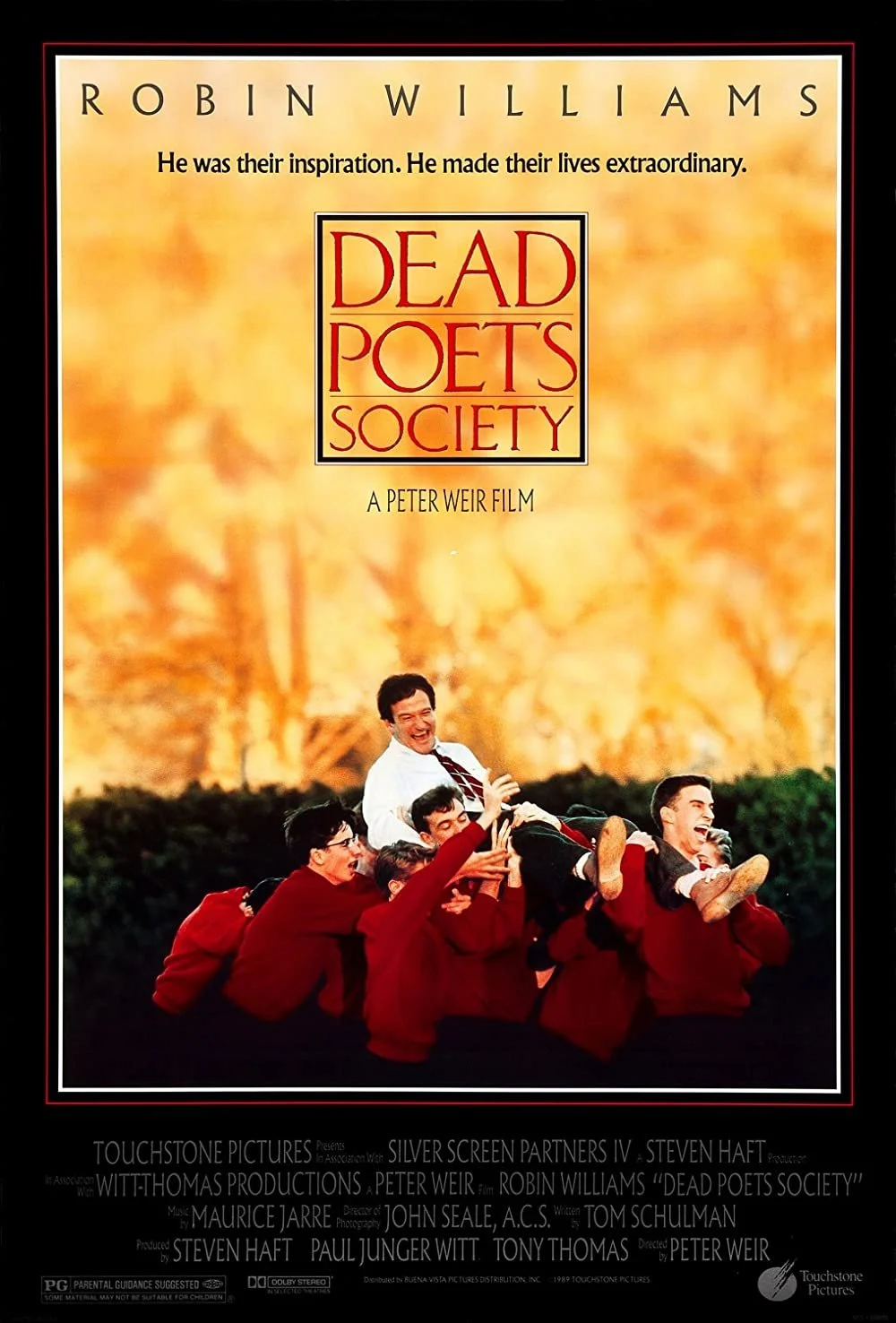What Robin Williams, Dead Poets Society, & Good Will Hunting Teach Us About Mentors
Mentors have the power to change your life – just look at two of Robin Williams’ best roles.
Williams is often regarded as a comedic genius (with good reason), but I would argue that he truly shines in dramatic films and roles where his joy adds to the gravitas of the story.
This is especially clear in Dead Poets Society and Good Will Hunting, which showcase the power of a mentor in fiction, but also show what they can do for us in real life – Williams not only plays an older male influence to fictional characters, but also mentored the young actors Ethan Hawke, Matt Damon, and Ben Affleck right before they become A-Listers in their own right.
They rose, in part, because Williams put stock into the next generation of entertainers.
Dead Poets Society: “Don’t you forget this.”
The 1989 Touchpoint Pictures film won Best Screenplay at the Oscars (its screenwriter being Tom Schulman) and garnered Robin Williams a best actor nomination. Today, it still sits on many ‘most influential’ movie lists and is one audiences have revisited countless times.
One scene in particular brilliantly showcases how a mentor is able to see the potential in you, even when you see yourself as worthless. The English class at the prestigious boys’ prep school, Welton Academy, was told to bring an original poem to class. Here’s how it plays out.
“Now, who’s next?” Williams’ character, Mr. Keating asks a mousy Todd Anderson (Ethan Hawke, in his first movie role). Mr. Keating continues, “Mr. Anderson, I see you sitting there in agony. Come on, Todd, step up, let’s put you out of your misery.”
“I didn’t do it. I didn’t write a poem,” Todd squeaks.
“Mr. Anderson thinks that everything inside of him is worthless and embarrassing,” Keating tells the class. “Isn’t that right, Todd? And that’s your worst fear.”
Todd then looks up at his teacher, intrigued that he pegged him so well, but also still terrified.
“Well, I think you’re wrong,” Keating says, “I think you have something inside of you that is worth a great deal.” Keating proceeds to bring Todd up to the front of the class to have him sound a barbaric yawp.
After several pathetic attempts from Todd, Keating gets in his face: “Oh good God man, yell like a man.”
“Yawp!” Todd bellows.
Keating then takes the power of that moment to release Todd’s poetic ability on the fly – as Todd’s insight pours forth like a river, his classmates sit there, stunned. Todd finishes, and Keating takes a seat at the wonder of what just happened, in what is arguably the most genuine moment of his entire career.
Keating stands, grabs Todd by the back of the head, and leans in: “Don’t you forget this.”
Don’t you forget this. What a truth bomb that only a true mentor could deliver.
In a 2018 Graham Norton Show interview, Hawke said that Williams made his career after his role in Dead Poets Society: “Williams was playing this teacher and he would just improv,” Hawke explained. “The more he did it, the more the crew would just lose it. I really wanted to be a serious actor. I really wanted to be in character and I didn’t want to laugh. The more I didn’t laugh, the more insane he got. He would make fun of me, ‘Oh, this one doesn’t want to laugh.’ I thought he hated me because he would constantly lay into me. Then, when the movie was over, I had to go back to school. I got this call and it was from a big Hollywood agent. This guy says, ‘I’m Robin Williams’ agent and he says you are going to be somebody and I should sign you.’ And I said ‘Really?’ So he [Robin] got me my first agent, who is still my agent now.”
Good Will Hunting: “Sean, not you.”
Eight years after Dead Poets Society, Williams would again invest in the lives of talented young men when he was pitched a script written by two twenty-somethings no one had ever heard of, and took it. The 1997 Miramax flick, Good Will Hunting, would make Ben Affleck and Matt Damon Oscar-winning writers, and give Williams his only Academy Award, which was for Best Supporting Actor.
The film boasts numerous extraordinary moments between Damon’s character, Will, the troubled boy genius, and Williams’, Sean McGuire, the unconventional psychologist who took a chance where no one else would. This next scene pinpoints the moment Will is able to break free from the horror of his childhood and gain the confidence to live his best life. Warning: I’ll skip the language but they are in the linked video.
At this point in the movie, Will and Sean have had many sessions together, and Will has some pretty big decisions coming up. Will steps into Sean’s office and the two chat casually, both relaxed. Sean assesses the moment and decides he can take Will to confront his dark past. He flips through Will’s court file and that shows his bruised body from long term violence at the hands of his foster father. Will asks Sean if he was ever abused. Sean answers that he used to take the punishment from his drunk father so that he could protect his mother and little brother.
Will attempts to shrug off the conversation with some psycho-education: “So what is it [the diagnosis]? Will has an attachment disorder, is it all that stuff?”
Sean nods, but pierces Will with a glance that says, I am so sorry you lived through this.
Will is starting to fidget. “Fear of abandonment? Is that why I broke up with [my girlfriend]?”
“I didn’t know you had,” Sean says honing in on Will. “Do you want to talk about it?”
Will says no, but looks as though he’s fighting back sobs. Sean moves in.
“Hey, Will, I don’t know a lot. But you see this,” he holds up the file, “all this, this is not your fault.”
Will shrugs that off. “Yeah. I know.”
Sean presses in with the statement, “It’s not your fault,” until Will gets angry. Sean then pulls that barbaric yawp from Will, too.
“Don’t mess with me. Don’t mess with me, Sean, not you!”
Sean is in Will’s face. “It’s not your fault.”
Will breaks down. He sobs into his hands. Sean grabs the back of Will’s head gently. “It’s not your fault.”
Will grabs for Sean as though he is reaching for a life raft, about to drown. “Oh God, I’m so sorry,” Will weeps.
Sean clutches Will back. We see Sean’s smiling, tearful eyes and you can hear his thoughts, He did it. The kid did it. He broke through and he’s going to be okay.
After that moment, Will makes the decision to reunite with his girlfriend, take the risk, and follow her to California – something that would have terrified him had Sean not been willing to go into the darkness with him as a witness to the horror of his past.
What these films teach us about mentors.
Wallflower is a women’s magazine, and these two examples feature young men and a male mentor. So why include them? How are they relevant to us as women?
Because ultimately, this life lesson is the same for men and women: for us to become the best versions of ourselves, it’s essential that we have the input and influence of those who have already pushed through some of the very struggles we now face.
My mom prayed for me and my sisters to have women to talk to and lean on in times when we couldn’t talk to her. I’ve been lucky enough to have older women in my life who helped shape me and guide me, in addition to my own mom, and I credit that to her prayers.
So now, I pray it for others, and I pray it for you. We desperately need mentors to press us, to see us as more than how we incorrectly see ourselves, so that we can find our courage. Robin Williams’ best roles prove that.





